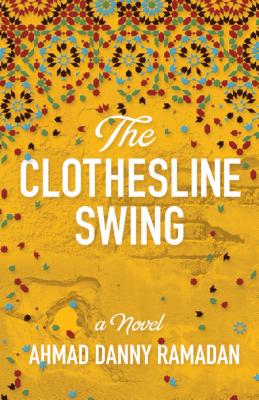 The Clothesline Swing
The Clothesline Swing
by Ahmad Danny Ramadan
Nightwood Editions
286 pages, $19.95
TWO YEARS AGO, in an anthology of essays by queer and transgender writers, the activist and then would-be novelist Ahmad Danny Ramadan wrote: “Being an lgbtq person in the Arab world is not a challenge you face every now and again. You face it every day, feeling unsafe in almost every context. Like children lost in the woods, every sound is a bear attacking, every pair of fireflies is the haunting eyes of a crouching wolf.”
By the time of that essay, Ramadan, who immigrated to Canada from his native Syria in 2014, had already published two collections of short stories in Arabic. Now the Canadian publisher Nightwood Editions has brought out Ramadan’s first novel, The Clothesline Swing. Written in English, it powerfully fleshes out just how much of a challenge it is to be gay in the Arab world.
The Clothesline Swing is the story of two gay Syrians, lovers and refugees, who flee their war-ravaged country for a new life in Canada. Set in the future, some forty years after they first arrive in Vancouver, the story focuses on the now old couple’s final months together. The narrator’s partner is dying. His only relief comes from the stories that his lover, whom he calls Hakawati (“storyteller” in Arabic), tells him. “I’m your Scheherazade,” Hakawati tells his sleepless partner. “I offer you souvenirs: my stories, the pieces of my soul, to help you sleep.”
These nightly vigils are a chance for Hakawati to “wander away into an old paradise of memory,” taking stock of his past: his family, his friends, his native city of Damascus, a city where jasmine once grew “on beautiful red-haired women’s balconies.” It was, he recalls, a time “before feasts forgot to visit Syria.”
Through these stories, we learn that Old Damascus, a city “that slept between the mountains,” was a place of great charm. Within its walls buzzed a colorful world of alleyways, souks, shops, and cafés. Culturally and historically, it was a multi-layered city, where the histories of Muslims, Jews, and Christians intersected. But for every lovely recollection of his native city, Hakawati is also visited by memories that feel “like the waves of an angry sea, carrying me deeper into the black waters of … sorrow.” This is the Syria of the Assad regime, where men are brutally whipped for “crimes against decency,” where propaganda takes the place of truth, where gay men, forced to marry women, commit suicide. It is a country “where everything ended eventually.”
As he tells his stories, Hakawati is visited both by ghosts from the past and by the presence of Death, who patiently waits to take his lover. These spectral visitors give the storyteller an opportunity to wrestle with the demons of his childhood and to reflect on Syrian history: the 1200 years of occupation by outside forces “with different agendas”; the rise of the Ba’ath party; the shaky union between Syria and Egypt; the era of coups when “people weren’t sure if they would wake up tomorrow to the same president they elected this morning”; and the battlefield of nationless people that Syria is today. “Our modern history,” Hakawati says, “revolves around our joined misery. Our collective pride in identity is limited to our individual pride in ourselves.”
The novel becomes a tangle of stories, ones that interweave the lovers’ narrative with other narratives, both real and imagined. “My memories are glass jars I squeeze endlessly but can’t open,” Hakawati observes. So many of the stories he tells are about survival—fairy-tale survivals and actual survivals (or “perhaps survivals”) of refugees illegally traveling the seas at night, picked up and deported, never to be heard from again. “Even when you tell stories of survival,” Hakawati’s lover complains, “the ending is never a happy one.”
For this reader, the most gripping of the novel’s survival stories center on the fragile gay underworld in Damascus. In a house that becomes the party hub for lesbians and gay men, the narrator and his friends drink and sensually play with each other’s bodies to the rhythm of war. “We slowly abandoned the world around us and accepted that life can revolve around casual sex, funny Margaret Cho and Bassem Feghali YouTube videos, vodka shots and Mortal Kombat.”
As the lovers consider leaving Syria, a Facebook friend tells Hakawati: “Vancouver is a beautiful, rainy, open city filled with love. You’ll be able to live here out of the closet, openly, and celebrate your love.” But it’s not that simple. Ramadan poignantly describes the couple’s intercultural dislocation in their new homeland. Canada becomes the place where they “have to face the reality of being refugees.” “We rarely leave the past behind and completely let go,” Hakawati observes. “Sometimes we even forget the past, but its residue remains within us.”
Ramadan’s juxtaposition of the rawness of history and the dreamscapes of fantasy—his imaginative mélange of stories, voices, and timeframes—is daring and deftly handled. Through the storyteller-narrator, the author succeeds in rescuing some of Syria’s voiceless from oblivion.
With The Clothesline Swing, Ramadan joins an impressive array of talented and diverse literary voices that have emerged within the gay Muslim diaspora: writers such as Rabih Alameddine (born in Lebanon), Abdellah Taïa (born in Morocco), Saleem Haddad (born in Kuwait), Kamal Al-Solaylee (born in Yemen), and Hasan Namir (born in Iraq). Ramadan, who is 33, is one of the youngest in this group. Already he has racked up an impressive list of accomplishments that have earned him the designation “jack-of-all-trades”: an activist, journalist, public speaker, refugee rights advocate, and creative writer. In 2016, he served as grand marshal for Vancouver’s Pride parade. Whatever his other credits, Ramadan’s talent as a young writer is beautifully evident in this debut novel.






